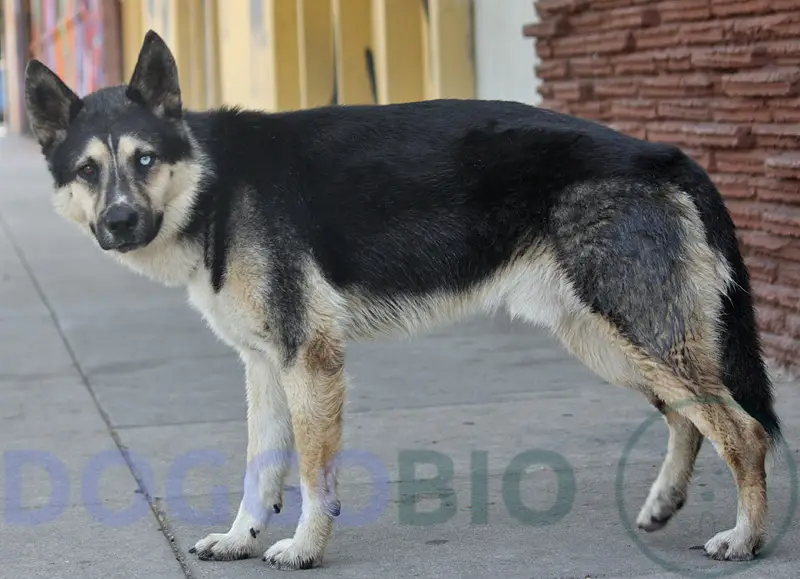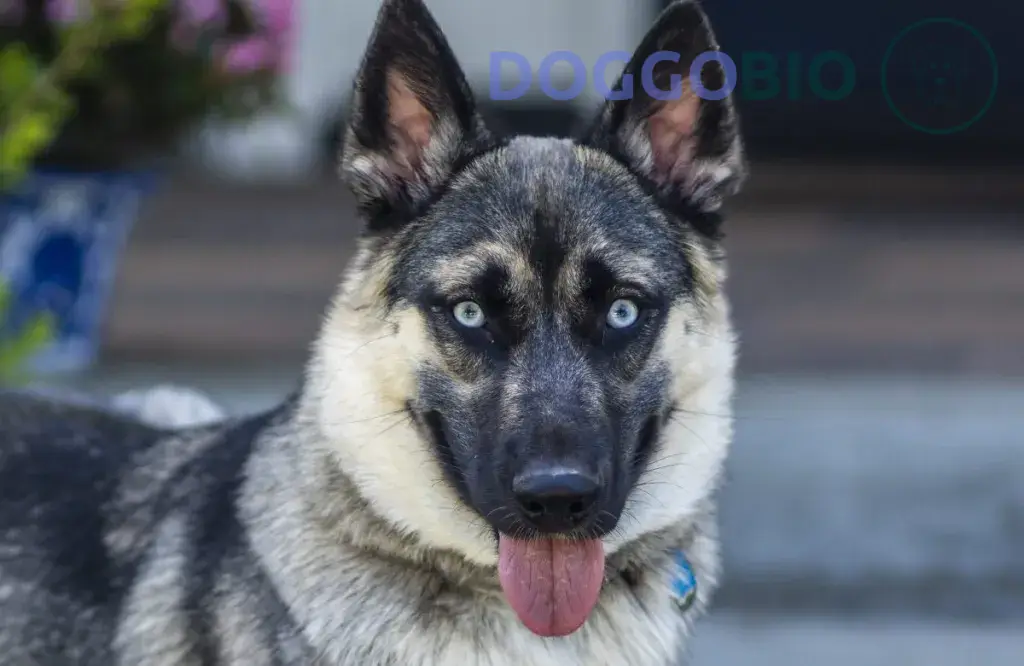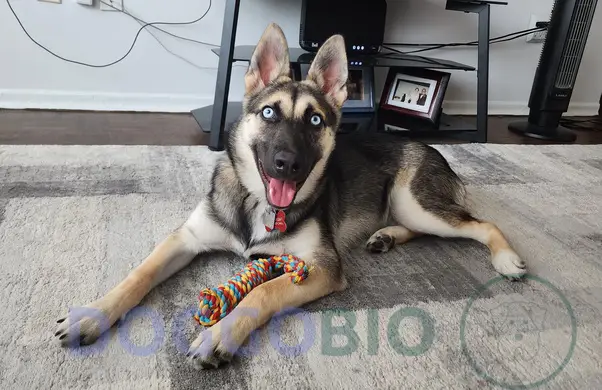The Gerberian Shepsky, a blend of German Shepherd and Husky, captures the essence of both breeds—combining strength, intelligence, independence, and loyalty.
This mixed breed, adored for its balanced traits, thrives in a family setting and excels in guardianship, courtesy of its German Shepherd lineage. Size-wise, it stands as a middleweight champion, merging the Husky’s medium frame with the larger stature of a German Shepherd, and is considered a furry addition to your clan.
Dive into our all-encompassing guide, covering everything from their history to grooming needs, and join our vibrant community for more heartwarming pet tales!
A Brief Overview of German Shepherd Husky Mix
| Aspect | Description |
| Average Lifespan | Typically ranges from 10 to 13 years |
| Physical appearance | Height: 20-25 inches; Weight: 45-80 pounds (varies by gender) |
| Cost Range | Typically falls between $400 and $1500 |
| Training | Highly trainable with a keenness to please; learns quickly |
| Temperament | Affectionate, playful, and has a protective instinct |
| Health Risks | Potential for Elbow and Hip Dysplasia, Prone to Eye Degeneration |
| Energy Levels | High; requires ample stimulation to prevent boredom-related behaviors |
| Exercise | Daily intake should be between 1300-2400 calories, adjusted based on activity levels |
| Suitability | Highly recommended as an excellent companion for families |
What is a German Shepherd Husky Mix?
A German Shepherd Husky mix, often called a Gerberian Shepsky, is a hybrid of the German Shepherd and Siberian Husky breeds, combining traits from both parents.
History of German Shepherd Husky Mix
Diving into the Gerberian Shepsky’s roots, we explore the ancestry of the robust Husky and the diligent German Shepherd. The latter, emerging in 1899 in Germany, excelled in herding and safeguarding sheep, securing its place as a beloved breed in America.
Meanwhile, the Husky’s legacy began three millennia ago in Siberia, captivating Alaskans by 1908 with their sled-pulling prowess and endearing quirks.
The inception of the Gerberian Shepsky blend remains unrecorded, likely a lucky outcome, now cherished worldwide amidst the designer breed trend for its pleasant and faithful nature.
What does a German Shepherd Husky Mix look like?

Size, height, and Weight
The Shepsky, blending German Shepherd and Siberian Husky traits, generally falls into the medium to large size category. While there’s variation due to its mixed breed nature, they typically weigh between 45 to 88 pounds and stand 20 to 25 inches tall at the shoulder, though sizes can vary.
Coat colors and Types
The Shepsky’s coat, a blend of its German Shepherd and Siberian Husky heritage, showcases a variety of colors and patterns, typically combining multiple hues.
Their thick, double-layered fur requires regular grooming to manage shedding and maintain coat health, especially suited for colder climates thanks to their Husky ancestry.
Regular brushing is essential, while baths should be infrequent to preserve the coat’s natural oils.
Temperament and Personality
The Gerberian Shepsky, a mix of German Shepherd and Husky, showcases diverse temperaments, inheriting friendly, goofy, and gentle traits from Huskies and loyalty and courage from German Shepherds.
This blend results in a balanced, protective, and loving family member thriving with early socialization and enjoying playful and challenging activities. They suit active families but may not be ideal for first-time pet owners due to their need for engagement and training to prevent boredom-related behaviors. Engage them with varied exercises and mental stimulation for their well-rounded development.
Training and Exercise Requirements
Training and socializing a Shepsky, a blend of intellect from its German Shepherd heritage and Husky’s playful spirit, demands early and consistent efforts. One Shepsky, Bella, transformed from being shy around strangers to a friendly, well-behaved dog through persistent training, illustrating the breed’s adaptability and friendly nature when adequately guided.

The Gerberian Shepsky thrives on diverse, engaging exercise routines, requiring ample daily activity to stay content. They’re best suited to spacious environments, not confined apartments, and enjoy varied physical challenges, from interactive games to exploration. Ensuring they have enough physical and mental stimulation is crucial to their happiness, complemented by loving downtime with their families.
Grooming and Cleaning
The Gerberian Shepsky’s grooming needs and appearance are as distinctive as their lineage, boasting a variety of possible coat colors and eye hues, including the possibility of heterochromia.
Their double coat, inherited from their Husky ancestry, is suited for cold and warmer climates, necessitating regular grooming to maintain skin health without over-bathing, which could strip natural oils.
Combining traits from both parent breeds, their striking look is visually appealing and practical for their well-being.
Living Condition
Shepskies thrive in spacious environments unsuitable for small apartments and require indoor and outdoor areas to explore and play. Urban owners must adapt, ensuring regular, active outings.
Social interactions in places like parks, where they can meet various breeds, benefit their social skills, and enhance the dog owner’s experience.
Food and Diet
Feeding your Gerberian Shepsky involves tailoring their diet to their energetic, large-breed needs, focusing on high protein intake. Their caloric demands vary with their life stage, activity level, and size. Puppies need growth-supportive food, while adults require controlled calories based on their exercise.
Splitting meals helps prevent digestive issues and a quality, large-breed-appropriate diet ensures they receive all necessary nutrients, keeping treats within their daily calorie allowance.
Life Expectancy and Common Health Issues
Shepsky health matters mirror those of their Husky and German Shepherd lineage, necessitating vigilant health screenings from breeders.

Awareness of potential issues like hip/elbow dysplasia and eye conditions such as cataracts is crucial, and early detection is critical to managing these inheritable conditions.
Additionally, monitoring for signs of bloat, particularly in the German Shepherd lineage, is essential for their well-being, emphasizing the importance of regulated feeding practices to mitigate risks.
How Much is a German Shepherd Husky Mix?
The cost of a German Shepherd Husky mix fluctuates significantly, influenced by factors like the breeder’s reputation, their geographic location, and the puppies’ lineage. Prices generally range from $400 to $1200 for these pups.
How Can I Find a German Shepherd Husky Mix For Sale?
While breed-specific Shepsky rescues are scarce due to their mixed heritage, looking into German Shepherd or Siberian Husky rescues is a good alternative as they often accommodate mixes.
Ensuring you connect with a reputable breeder is crucial; they prioritize the health and socialization of their puppies, contrasting sharply with backyard breeders, whose focus on profit can lead to health and behavioral issues in the puppies.
Always choose breeders committed to their dogs’ well-being, providing a solid foundation for the puppies they bring into the world.
Frequently Asked Questions
Does AKC recognize German Shepherd Husky Mix?
No, the AKC does not recognize the German Shepherd Husky mix as it is a hybrid breed and lacks an official breed standard, expected in designer breeds.
Is a German Shepherd Husky Mix Aggressive?
No, German Shepherd Husky Mixes are not inherently aggressive but require consistent training and socialization to prevent aggressive tendencies from developing.
Does a German Shepherd Husky Mix Get Along With Other Pets?
Yes, The German Shepherd Husky Mix typically gets along with other pets if they have been socialized early or grown up together. However, each dog’s personality is distinct, so careful and supervised introductions are crucial.
How Long Can a German Shepherd Husky Mix Live?
The German Shepherd Husky mix generally enjoys a lifespan of 10 to 14 years, with longevity significantly influenced by the quality of care, including optimal nutrition and consistent veterinary oversight, ensuring a fulfilling life.
Do German Shepherd Husky Mixes Shed A Lot?
Yes, German Shepherd Husky Mixes are prone to shedding, particularly with the changing seasons, attributed to their dense double-layered coats.
Are German Shepherd Husky Mixes hypoallergenic?
No, German Shepherd Husky Mixes aren’t hypoallergenic, as their thick double coats lead to considerable shedding.
Conclusion
Explore the traits of the German Shepherd Husky Mix, a blend of intelligence, loyalty, and protectiveness, coupled with a friendly and affectionate demeanor. Ideal for active families, this dog is a devoted companion and an enthusiastic partner for all your adventures. Is this versatile, engaging breed the perfect addition to your home?

Simply wish to say your article is as amazing The clearness in your post is just nice and i could assume youre an expert on this subject Well with your permission let me to grab your feed to keep updated with forthcoming post Thanks a million and please carry on the gratifying work.